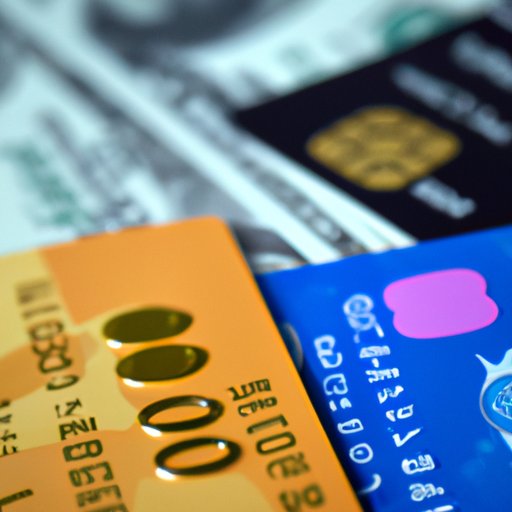
Introduction
Many credit card users face unexpected expenses or emergencies that require immediate cash. While credit cards offer convenience and flexibility, they also come with drawbacks, including high interest rates, penalties, and fees. This article explores the pros and cons of pulling cash from your credit card, alternatives to this method, and tips for minimizing fees and maximizing savings.
The Pros and Cons of Using Your Credit Card to Pull Cash
One of the primary advantages of using your credit card to withdraw cash is that it offers quick and easy access to funds. This can be particularly helpful in emergencies or situations where cash is required and other payment methods are not accepted.
On the other hand, withdrawing cash from your credit card can be an expensive option, with high interest rates and fees. Most credit cards charge a higher interest rate for cash advances than for regular purchases, and cash advances often incur additional fees, such as transaction fees and cash advance fees.
For example, let’s say you need $500 in cash and decide to pull it off your credit card. If your card has a 25% cash advance APR and a 5% cash advance fee, you would owe $625 in total. That means you’d pay $125 in fees and interest just for accessing the cash.
Additionally, some credit cards may only allow you to withdraw a small amount of cash, and the available credit limit will be reduced by the cash advance amount until it is paid off. This can negatively impact your credit utilization ratio, which is a major factor in determining your credit score.
Alternatives to Pulling Cash from Your Credit Card
Fortunately, credit card cash advances are not the only option for accessing funds. Personal loans, lines of credit, and other types of financing can provide more affordable and flexible alternatives.
Personal loans, which are typically offered by banks, credit unions, and online lenders, allow consumers to borrow a fixed amount of money with a set repayment term and interest rate. Personal loans typically have lower interest rates than credit cards, making them a more cost-effective option for larger purchases or unexpected expenses.
Another option is a line of credit, a type of revolving credit that allows consumers to access funds as needed, up to a certain credit limit. Lines of credit typically have variable interest rates and can be secured or unsecured.
Other alternatives include payday loans, cash advances from friends or family members, or even selling unwanted items for quick cash. Each of these options requires careful consideration and may have pros and cons depending on your specific financial situation.
How to Avoid Cash Advance Fees on Your Credit Card
If you must withdraw cash from your credit card, there are ways to minimize the fees and interest you’ll owe:
- Look for credit cards with lower cash advance fees and interest rates
- Pay the cash advance off as soon as possible to avoid accruing additional interest
- See if your card offers a 0% introductory APR or rewards program that can offset the fees and interest
- Consider using a balance transfer to move the cash advance to a card with a lower interest rate
By being strategic and taking a proactive approach to repaying the cash advance, you can save money and avoid spiraling into debt.
Top Credit Cards for Cash Advances in 2021
While cash advances should generally be avoided unless absolutely necessary, some credit cards do offer favorable terms if you need quick cash. Here are a few top credit cards to consider:
- Chase Freedom Unlimited: 0% APR on cash advances for 15 months; no cash advance fee for the first year
- Discover it: No cash advance fee; 0% APR for the first 14 months
- Capital One Quicksilver: No cash advance fee; variable cash advance APR between 24.99% and 26.99%
It’s important to note that each of these cards may have specific eligibility requirements and limitations. Be sure to read the terms and conditions carefully to understand the full cost of using a particular card for cash advances.
Is Pulling Cash from Your Credit Card Worth It?
Ultimately, whether or not pulling cash from your credit card is worth it depends on your individual financial circumstances and goals. In general, it’s best to avoid cash advances and consider alternative funding options when possible to save money and protect your credit score.
If you do need to withdraw cash from your credit card, be sure to weigh the benefits and drawbacks, research your options, and plan ahead to minimize fees and interest.
Conclusion
While credit card cash advances can offer quick and easy access to funds, they are often expensive and can have negative repercussions on your credit score. By exploring alternative financing options, minimizing fees, and being strategic about paying off debt, you can make informed financial decisions and protect your financial future.
If you have questions or need additional guidance, be sure to consult a licensed financial advisor or credit counselor for personalized advice.




